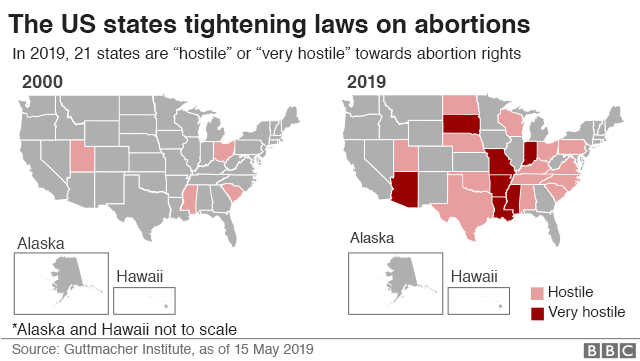States with Strictest Abortion Laws

What are the strictest abortion laws in the United States?
Alabama
Alabama has some of the strictest abortion laws in the United States. In May 2019, the state passed a law that effectively bans abortion in all cases, including cases of rape and incest. The only exception is if the mother's life is in danger. This law has been temporarily blocked by a federal judge, but it is still considered one of the harshest abortion laws in the country.
Arkansas
Arkansas has one of the most restrictive abortion laws in the United States. In 2015, the state passed a law that bans abortions after 12 weeks of pregnancy, with exceptions for cases of rape, incest, and medical emergencies. This law has been challenged in court, but it is still in effect.
Georgia
Georgia passed a law in 2019 that bans abortions after six weeks of pregnancy, which is before many women even know they are pregnant. This law has been challenged in court and is currently blocked, but it is still considered one of the strictest abortion laws in the country.
Mississippi
Mississippi has some of the strictest abortion laws in the United States. In 2018, the state passed a law that bans abortions after 15 weeks of pregnancy, with exceptions for cases of severe fetal abnormality or if the mother's life is in danger. This law has been challenged in court but is still in effect.
What are the implications of these laws?
These strict abortion laws have significant implications for women's access to safe and legal abortions. Women in these states may have to travel long distances to access abortion services, which can be financially and emotionally burdensome. Additionally, women may turn to unsafe and illegal abortions if they are unable to access safe and legal options.
What are the pros and cons of these laws?
Pros
- Some people believe that these laws protect the lives of unborn children and promote a culture of life.
- These laws may reflect the beliefs and values of the people who live in these states.
Cons
- These laws may limit women's access to safe and legal abortions, which can lead to negative health outcomes.
- These laws may disproportionately affect low-income women and women of color.
- These laws may violate women's constitutional rights.
FAQs
Q: What is Roe v. Wade?
A: Roe v. Wade is a landmark Supreme Court case that established a woman's legal right to have an abortion. The case was decided in 1973 and has been a significant factor in shaping abortion laws in the United States.
Q: Can women still get abortions in states with strict abortion laws?
A: Yes, women can still get abortions in states with strict abortion laws, but it may be more difficult for them to access safe and legal abortions.
Q: What is a medical abortion?
A: A medical abortion is a procedure that uses medication to end a pregnancy. It is typically done in the first 10 weeks of pregnancy and involves taking two different types of medication.
Q: Can men have a say in abortion laws?
A: While men cannot have a direct say in abortion laws, they can be involved in the debate and advocacy surrounding the issue. Men can also support women who are seeking abortions and advocate for policies that promote women's reproductive rights.
